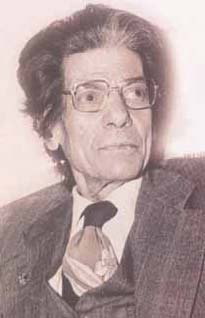The following is a list of Egyptian music composers.
Contents

The following is a list of Egyptian music composers.


According to the work of the Egyptian musicologist Samha El-Kholy, the first generation of Egyptians to begin writing in modern Egyptian classical style were born around the turn of the 20th century. [1]
Among the most celebrated composers in Egyptian history who lived in the 20th century are Sayed Darwish, Mohamed El Qasabgi, Baligh Hamdi, Mohamed Fawzi, Zakariya Ahmad, Mohamed Abdel Wahab, Riad El Sunbati and many others. [2]

Gamal Abdel-Rahim was a distinguished Egyptian classical music composer and composition professor.

Abdel Halim Ali Shabana, commonly known as Abdel Halim Hafez, was an Egyptian singer, actor, conductor, businessman, music teacher and film producer.

Egypt competed at the 1952 Summer Olympics in Helsinki, Finland. 106 competitors, all men, took part in 65 events in 14 sports.
The discography of Lebanese singer Fairuz includes a large repertoire of more than 1,500 songs, out of which nearly 800 were released. Fairuz has sold more than 150 million records worldwide.

Hany Shaker is an Egyptian Singer, actor and composer. His first public appearance was when he sang with Abd El Halim Hafez Choral Group in "Sora", then he played the young Sayed Darwish in the movie Sayed Darwish.
Aziz El-Shawan was one of the most prominent Egyptian composers of the twentieth century. He completed his primary and secondary education at the St. Joseph – La Salle College in Khoronfish, Cairo where he also received a Higher Diploma in Commercial Studies. He studied the violin privately with the German Joseph von Aubervon, a student of Jan Kubelick, and joined the school's choir and band where he played the clarinet and French horn. His violin teacher obtained a scholarship for him to study at the Berlin Conservatory, however, his father objected to his interest in pursuing a musical career. An accident disabled one of the fingers of his left hand, obliging him to give up his dream of being a virtuoso violinist. He then studied piano, theory, harmony, composition and orchestration with the Italian Menato and the Russian Orlovitsky who were part of a community of European musicians and music teachers who lived and worked in cosmopolitan Cairo. El-Shawan held several administrative positions, most importantly at the Philips International Company where he founded a record production department. He was director of the Soviet Cultural Center in Cairo from 1952 up to 1967. This position enabled him to travel to Moscow in 1956 where some of his early works were performed by the Radio Moscow Orchestra conducted by Aram Khatchaturian and published on LP by the Melodiya state record company, including the Fantasia for Orchestra (1945), the Symphonic Poem ‘Atshan Ya Sabay (1946), and the overture of Opera ‘Antara (1947). He also came in contact with the music of several contemporary composers, most notably the Russian Dmitri Shostakovich (1906-1975), the Armenian Aram Khatchturian and the Azerbajianis Uzeyir Hadjibekov, Kara Karayev and Fikret Amirov. In addition to the influence of Rachmaninov and the Russian Five, El-Shawan saw the style of these west and central Asian composers as a model of a contemporary musical idiom inspired in traditional music. In Cairo, some of his early works were premiered in 1954 at the American University's Ewart Memorial Hall by a private orchestra that he hired and conducted as the state funded Cairo Symphony Orchestra had not yet been founded.

Samha Amin El-Kholy was a noted Egyptian musicologist. She published widely about the traditional music and contemporary music of Egypt, including several articles about contemporary Egyptian composers in The New Grove Dictionary of Music and Musicians.
Mohamed Abdelwahab Abdelfattah is an Egyptian composer of contemporary classical music and educator. He is a member of Egypt's third generation of classical composers.

Baligh Hamdi was an Egyptian composer who created and composed many hit songs for several Arab singers, especially during the 1960s and 1970s. He composed Warda's most famous songs, and the two got married for a long period.

The Ministry of Justice is the justice ministry of the government of Egypt. Its headquarters are in Cairo.
Kamel Al Rimali - (2011) was an Egyptian classical composer. His opera in Arabic Hasan Al-Basri is based on the life of Hasan of Basra.
The following is a list of the people elected to the People's Assembly of Egypt in the 2011-2012 election.

Mayada El Hennawy is a Syrian singer. She lived a part of her life in Egypt where she collaborated with many famous Egyptian musical composers like Mohamed El Mougy and Mohamed Abdel Wahab, who created popular musicals of her songs.

Nagat El-Sagheera is an Egyptian singer and actress. She retired from filming in 1976 and from singing in 2002. Nagat began her career at the age of five and retired 59 years later.

Riad Mohamed El Sunbati, also written as Riad Sonbati or Riadh Sonbati was a 20th-century Egyptian composer and musician who was considered an icon of Egyptian Music. The number of his lyric works is 539 works in Egyptian Opera, operetta, cinematic and religious song, poem, Taqtouqa and Mawalia. The number of song poets who he composed for is more than 120 poets. He composed for many famous Arab singers including Umm Kulthum, Fairouz, Asmahan, Warda Al-Jazairia, Najat Al Saghira, Mounira El Mahdeya, Fayza Ahmed, Saleh Abdel Hai, and Aziza Galal.
Nashid al-Amal is an Egyptian film starring Umm Kulthum. It ran for 125 minutes and was released on January 11, 1937. The film marks the directorial debut of Ahmed Badrakhan.
The Treasure: Truth and Imagination is a 2017 Egyptian film that spans across three distinct eras: the Pharaonic era, the Mamluk era, and the first half of the 20th century. The film is directed by Sherif Arafa, written by Abdel Rahim Kamal, and produced by Walid Sabry, and stars Mohamed Saad, Mohamed Ramadan, Hend Sabry, Ahmed Rizk, Ahmed Hatem, Amina Khalil, and Ruby.

Seret El Hob is an Egyptian Arabic song performed by the Egyptian singer Umm Kulthum. The song was written by Morsi Gamil, and composed by Baligh Hamdi. It was released in 1964, and it remains one of Umm Kulthum's most celebrated and iconic works.